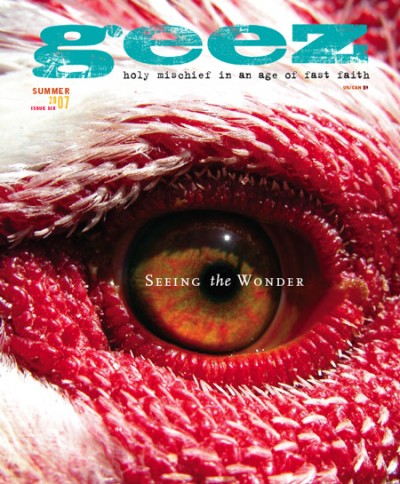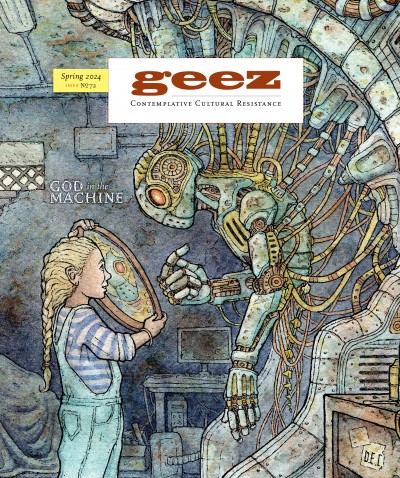Find the eyes to see
I have a growing sense of unease about surrendering my time and attention to highly-manufactured representations of reality – like movies and anything digital. This doesn’t mean I’ve stopped using computers or browsing through web portfolios for photos to include in this magazine. But it does mean I’m paying more attention to what affects how I see.
The triumph of advertising in the culture industry is that consumers feel compelled to buy and use its products even though they see through them. – Theodor Adorno and Max Horkheimer
One day I did an experiment in the way I see. It was a weekend evening and my housemate, Eric, invited a bunch of people over to watch a movie. He brought home a video projector from work and turned it into an event.
He rented Winged Migration, which was enjoying media buzz as a spectacular new nature film, touted as a breakthrough in documentary cinematography. The cameras somehow fly along with migrating flocks of birds.
From the intimacy of our living room, we could be swept up into the sky and fly along with larger-than-life birds as they filled a four-foot-wide screen and squawked through our speakers.
I recall feeling awkward as I helped him arrange the chairs and set up the screen.
“Um, Eric, no offense, but I’m not going watch the movie with you guys tonight.” I winced. This was socially uncomfortable.
“Why not?” he asked.
“Because I don’t want the movie to skew my perception of the natural world. When I see birds in the sky, I don’t want to think of some documentary movie, I want to think of birds in the sky. No offense, I hope you enjoy it.”
He was puzzled. He said the movie would actually enhance my appreciation of nature, that the next time I see geese, I’d have a better understanding of them and what they go through. I didn’t give in.
So that night, I sat upstairs and read a book, overhearing the occasional rumble from the sound track and honking and squawking of birds flying through our living room.

I have a growing sense of unease about surrendering my time and attention to highly-manufactured representations of reality – like movies and anything digital. This doesn’t mean I’ve stopped using computers or browsing through web portfolios for photos to include in this magazine. But it does mean I’m paying more attention to what affects how I see.
Take Hollywood movies, for example. Through their selection of characters, location, plot, dialogue, sets and portrayal of dissidents they reinforce most of the power imbalances in society. Pick a problem: race, class, gender, relations with indigenous people or nature. Each of these will be addressed in a way that serves, supports and blesses what Theodor Adorno and Max Horkheimer called the “culture industry.” It’s essentially a factory system that produces pop culture to satisfy the masses to the point of docility, while the bosses of industry stay rich.
Even “outstanding” (this has to be in quotations because ours is a culture obsessed with hype, which is a problem) non-Hollywood films like Jesus Camp, Bowling For Columbine and An Inconvenient Truth, become blips in our discussion. And, because dissent is hot for the market, it’s just more fodder for the culture machinery.
As I plug in to this world – even to comment negatively upon it – I feel hip and relevant. But what has happened to my perception of the world, my way of seeing? I’m still in the cinema world, sitting in the row for curmudgeons, shaping views safe for the culture industry. It can’t be undermined or avoided, only actively resisted.
Why am I even talking about this? Because I’m in transition away from civilization. Okay, that’s a grand statement. But if civilization means more consumerism, preparing for war, paving roads, fencing in homes, more cell phone relationships, I want to go the other way.
I need to see another way, a beautiful way. Unfortunately, there are competing and non-humanizing views of beauty and wonder in our midst. The Wal-Mart aesthetic has crept into our heads. We look for bright colors, shiny knobs. We prize efficiency, and quantify value with price tags. We seem to enjoy anything that disconnects us from our natural surroundings. We accept and even prefer “virtual” reality and “simulated” flavors. We see beautiful golf greens on the sports television network and forget about where we live and dream about get-away vacations.
We are both victims and agents of this collective maladjusted vision. It is hard to see differently when most of our views are so “picture perfect.” But I’m trying to see differently, to embrace “plain-old” when offered “new and improved.”
I often think of the zen-like phrases Jesus offered to the world. “Don’t worry about your clothes. Look at the flowers, you should all be like flowers!” Or birds, learn from the birds. I have this deep sense that there’s some secret mystery to life that is within our grasp. Jesus was trying to communicate that vision, not an other-worldly vision but a fuller-worldly vision. It had to do with restoring Eden, seeing heaven on earth. It sounds magical, but I think he assumed we could see the radiant glory of Being Itself if only we had the eyes to see, the ears to hear. I want those eyes.
Aiden Enns is publisher of Geez magazine.



Sorry, comments are closed.